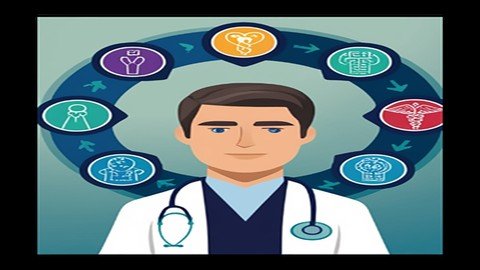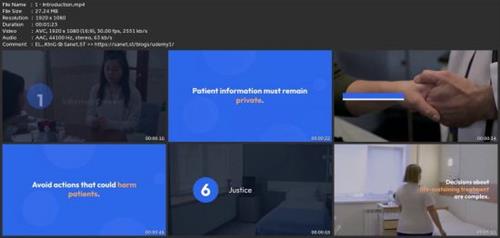- Joined
- Sep 14, 2023
- Messages
- 16,758
- Reaction score
- 0
- Points
- 36
Medical Ethics For Medical Students Health Care Professional

What you'll learn
Informed Consent
Confidentiality
Autonomy
. Non-Maleficence
Beneficence
justice
Requirements
No prerequisites
Description
Medical ethics is a branch of ethics that deals with the moral principles and guidelines that govern healthcare practices and medical decision-making. It provides a framework to help healthcare professionals navigate complex moral issues that arise in patient care, research, and public health. These principles aim to protect patient rights, ensure fairness, and maintain trust between patients and healthcare providers.Key Principles of Medical Ethics:Autonomy: Respecting a patient's right to make their own healthcare decisions, even if the healthcare provider disagrees with those decisions. This includes informed consent, where patients must be given all necessary information to make voluntary decisions about their treatment.Beneficence: Acting in the best interest of the patient by promoting their well-being and providing beneficial treatments. Healthcare providers are expected to do good by improving the patient's health and quality of life.Non-Maleficence: The principle of "do no harm." Healthcare professionals must avoid causing harm to patients. This involves carefully weighing the risks and benefits of treatments to ensure that the benefits outweigh any potential harm.Justice: Ensuring fairness in medical care and the equitable distribution of healthcare resources. This principle emphasizes that patients should be treated equally and that care should not be influenced by factors such as race, gender, financial status, or social class.Confidentiality: Protecting patient privacy by ensuring that personal health information is kept confidential and only shared with those directly involved in the patient's care or when required by law.Veracity: Healthcare providers have an obligation to be honest with patients. This includes giving truthful information about diagnoses, treatments, and prognosis.Fidelity: Being loyal and faithful to the commitments made to patients, maintaining trust, and upholding the ethical standards of the medical profession.Applications of Medical Ethics:End-of-life care: Ethical dilemmas around euthanasia, palliative care, and respecting a patient's wishes when they want to refuse life-sustaining treatments.Informed consent: Ensuring that patients understand the risks, benefits, and alternatives of treatments before agreeing to them.Resource allocation: Deciding how to fairly distribute limited medical resources, such as organ transplants or critical care beds.Confidentiality issues: Balancing the need to maintain patient privacy with the potential need to disclose information for public health reasons (e.g., contagious diseases).
Overview
Section 1: Introduction
Lecture 1 Introduction
Lecture 2 medical ethics definition and application
Lecture 3 What I Wish I Knew About MEDICAL ETHICS Before Becoming a Doctor
Section 2: Autonomy
Lecture 4 autonomy
Lecture 5 autonomy in health care
Section 3: competence and capacity to make decision
Lecture 6 minors
Section 4: informed consent
Lecture 7 informed consent
Lecture 8 informed cosent
Lecture 9 validate telephone call
Section 5: Confidentiality
Lecture 10 importance of confidentiality
Lecture 11 patient confedentiality
Lecture 12 confidentiality
Section 6: Non-Maleficence
Lecture 13 non- maficence meaning
Section 7: . Justice
Lecture 14 justice in medical ethics
Section 8: . End-of-Life Care
Lecture 15 End of life care
Section 9: sexually transmitted diseases
Lecture 16 STD
Lecture 17 doctor patient releationship
Section 10: doctor patient relationship
Lecture 18 reportingimpaired physician
Lecture 19 doctor patient
Section 11: doctor doctor relationship
Lecture 20 handling physician disagreements
Lecture 21 impaired physcian
Lecture 22 handling disagreement
Section 12: experimentation
Lecture 23 The consent process for participation in research and experimentation
Section 13: cases
Lecture 24 elderly patient
Lecture 25 duty to warn
Lecture 26 brain death determination
Lecture 27 determining brain death
Lecture 28 tuberculosis care of immigrant
Lecture 29 Reporting child abuse
Lecture 30 child abuse
Medical students Medical professionals

Say "Thank You"
rapidgator.net:
ddownload.com:

Published 10/2024
MP4 | Video: h264, 1920x1080 | Audio: AAC, 44.1 KHz
Language: English | Size: 573.20 MB | Duration: 0h 36m
what I wish to know about medical ethics before I became adductor
MP4 | Video: h264, 1920x1080 | Audio: AAC, 44.1 KHz
Language: English | Size: 573.20 MB | Duration: 0h 36m
what I wish to know about medical ethics before I became adductor
What you'll learn
Informed Consent
Confidentiality
Autonomy
. Non-Maleficence
Beneficence
justice
Requirements
No prerequisites
Description
Medical ethics is a branch of ethics that deals with the moral principles and guidelines that govern healthcare practices and medical decision-making. It provides a framework to help healthcare professionals navigate complex moral issues that arise in patient care, research, and public health. These principles aim to protect patient rights, ensure fairness, and maintain trust between patients and healthcare providers.Key Principles of Medical Ethics:Autonomy: Respecting a patient's right to make their own healthcare decisions, even if the healthcare provider disagrees with those decisions. This includes informed consent, where patients must be given all necessary information to make voluntary decisions about their treatment.Beneficence: Acting in the best interest of the patient by promoting their well-being and providing beneficial treatments. Healthcare providers are expected to do good by improving the patient's health and quality of life.Non-Maleficence: The principle of "do no harm." Healthcare professionals must avoid causing harm to patients. This involves carefully weighing the risks and benefits of treatments to ensure that the benefits outweigh any potential harm.Justice: Ensuring fairness in medical care and the equitable distribution of healthcare resources. This principle emphasizes that patients should be treated equally and that care should not be influenced by factors such as race, gender, financial status, or social class.Confidentiality: Protecting patient privacy by ensuring that personal health information is kept confidential and only shared with those directly involved in the patient's care or when required by law.Veracity: Healthcare providers have an obligation to be honest with patients. This includes giving truthful information about diagnoses, treatments, and prognosis.Fidelity: Being loyal and faithful to the commitments made to patients, maintaining trust, and upholding the ethical standards of the medical profession.Applications of Medical Ethics:End-of-life care: Ethical dilemmas around euthanasia, palliative care, and respecting a patient's wishes when they want to refuse life-sustaining treatments.Informed consent: Ensuring that patients understand the risks, benefits, and alternatives of treatments before agreeing to them.Resource allocation: Deciding how to fairly distribute limited medical resources, such as organ transplants or critical care beds.Confidentiality issues: Balancing the need to maintain patient privacy with the potential need to disclose information for public health reasons (e.g., contagious diseases).
Overview
Section 1: Introduction
Lecture 1 Introduction
Lecture 2 medical ethics definition and application
Lecture 3 What I Wish I Knew About MEDICAL ETHICS Before Becoming a Doctor
Section 2: Autonomy
Lecture 4 autonomy
Lecture 5 autonomy in health care
Section 3: competence and capacity to make decision
Lecture 6 minors
Section 4: informed consent
Lecture 7 informed consent
Lecture 8 informed cosent
Lecture 9 validate telephone call
Section 5: Confidentiality
Lecture 10 importance of confidentiality
Lecture 11 patient confedentiality
Lecture 12 confidentiality
Section 6: Non-Maleficence
Lecture 13 non- maficence meaning
Section 7: . Justice
Lecture 14 justice in medical ethics
Section 8: . End-of-Life Care
Lecture 15 End of life care
Section 9: sexually transmitted diseases
Lecture 16 STD
Lecture 17 doctor patient releationship
Section 10: doctor patient relationship
Lecture 18 reportingimpaired physician
Lecture 19 doctor patient
Section 11: doctor doctor relationship
Lecture 20 handling physician disagreements
Lecture 21 impaired physcian
Lecture 22 handling disagreement
Section 12: experimentation
Lecture 23 The consent process for participation in research and experimentation
Section 13: cases
Lecture 24 elderly patient
Lecture 25 duty to warn
Lecture 26 brain death determination
Lecture 27 determining brain death
Lecture 28 tuberculosis care of immigrant
Lecture 29 Reporting child abuse
Lecture 30 child abuse
Medical students Medical professionals
Screenshots

Say "Thank You"
rapidgator.net:
Code:
https://rapidgator.net/file/a3f12ec853f6937225f373d9ccc7c8f4/vobfb.Medical.Ethics.For.Medical.Students.Health.Care.Professional.rar.htmlddownload.com:
Code:
https://ddownload.com/rgjgq1wv5knw/vobfb.Medical.Ethics.For.Medical.Students.Health.Care.Professional.rar


